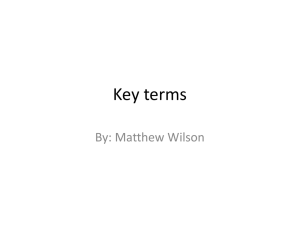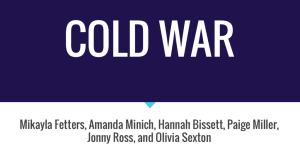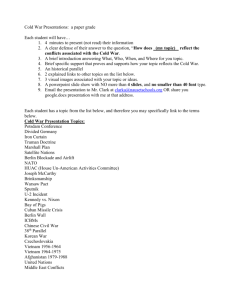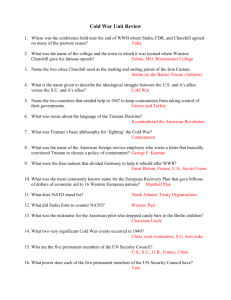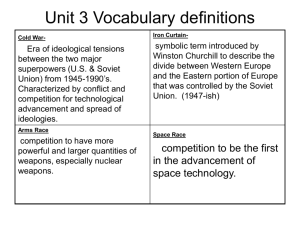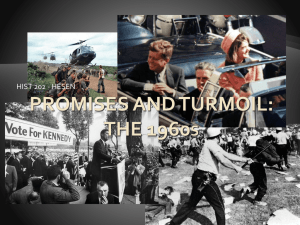2014 Spring Final Exam Review Guide
advertisement
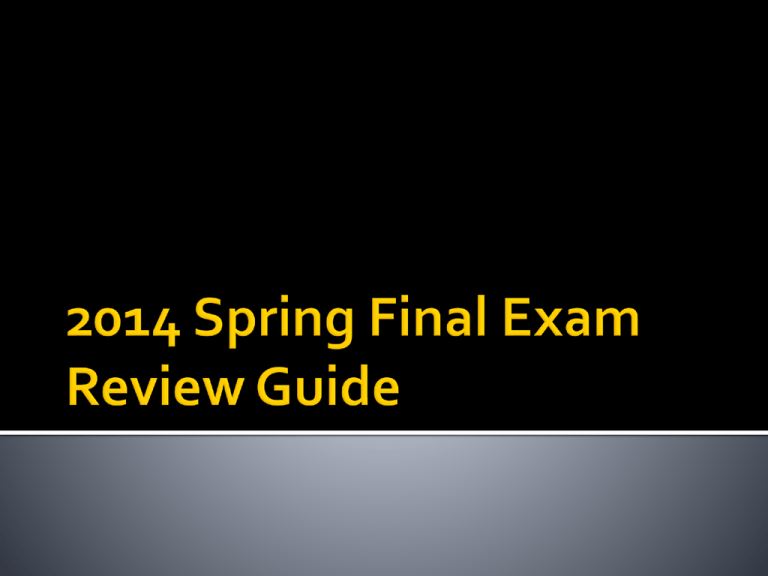
He had committed 500,000 troops He had committed over $100 billion Pulling out with no decisive results would leave questions about the importance of human and financial cost LBJ had the tiger by the tail and could not find a way to exit Vietnam Voting Act of 1965 gives federal government power to oversee federal elections Voting Act of 1965 ends racial discrimination at polls Average of 29% of African Americans registered to vote in 1965 Average of 65% of African Americans registered to vote in 1988 36% increase in African American voters over approximately 25 years Anti-war movement by young adults during the Vietnam Conflict Promoted rebellion against authority Protests and rallies against the actions of federal and state governments Use of illicit drugs Musical revolution Advent of birth control results in promescuity Provide financial support for Veterans of WWII Main uses of the G.I. Bill included: Obtain higher education (college) Direct financial support during schooling Purchase of a home Nonviolent Protests March on Washington Montgomery Bus Boycott Lunch-counter Sit-ins Greensboro, North Carolina Legal Action Brown vs. Board of Education of Topeka Soviet Union’s economy was decimated Berlin Wall is torn down in 1989 End to soviet domination in Europe End of the Soviet Union End of any threat of violence towards the U.S. by communist forces Many African Americans migrated between 1940 and 1970 in search of equality and jobs. What should people do? Just Laws People have a moral and legal obligation to obey and uphold laws that are in place to benefit and protect all citizens Unjust Laws People have a moral obligation to disobey laws that create unfair advantages for one group of people or oppress another Outlawed discrimination against minorities in the voting booth Literacy Tests Gave the federal government the power to oversee all federal elections and ensure that there was no discrimination Martin Luther King Jr. Malcolm X Arrested over 20 times for disobeying unjust laws Spent 6 years in prison for committing felonies Used peaceful protests to fight for civil rights Called for violent measures to fight for civil rights Wanted equality with whites and for blacks and whites to work together for freedom and equality for all Wanted blacks to be superior and called for equality with segregation McCarthy claimed to know of communist government officials Held hearings to question and badger suspected communists His policies led to the hysterical fear of communism None of his accusations were ever proven to be supported with any evidence Created for the following reasons: Boost the economy Improve education Scientific Advancement Flexible military response Aid impoverished nations Most notably, the Peace Corp and Space Program were created October 4, 1957 – USSR launches Sputnik 1 November 3, 1957 – USSR launches Sputnik 2 with a dog on board January 31, 1958 – U.S. launches Explorer 1 October 1, 1958 – NASA Created April 12, 1961 – USSR sends first man to space February 20, 1962 – U.S. John Glenn orbits the earth 3 times July 20, 1969 – Neil Armstrong (American) becomes first man to walk on the moon. Between 1946 and 1964 78.3 million babies are born Known as the “Baby Boom” This resulted in teacher shortages across the country. Economic Opportunity Act of 1964 Created programs such as Job Corps and Project Head Start Voting Rights act of 1965 Ended race-based restrictions on voting Medicare and Medicaid Act of 1965 Provided medical coverage for elderly and poor Americans Johnson had lost popularity in America due to the Vietnam Conflict Johnson knew reelection was highly unlikely in the election of 1968 Johnson declares on March 31, 1968 that he will not seek, nor accept the nomination of the Democratic Party for reelection During the Cuban Missile Crisis, Kennedy ordered a naval and air blockade of Cuba to keep Soviet assistance from the island Which is larger? Use the photo Supply train that moved military supplies south from North Vietnam to South Vietnam Went through Cambodia and Laos Made it impossible for the U.S. to logistically win the fight without invading nonaggressive nations. June 17, 1972 – 5 men break into the Democratic National Committee Headquarters at the Watergate Complex June 1974 – U.S. House of Representatives begin the impeachment process of Nixon August 9, 1974 – Nixon Resigns as President making Gerald Ford the President of the U.S. Ford pardons Nixon of all offenses Established October 24, 1945 Created to promote international cooperation and prevent another large scale world war. Its primary goal has been to promote peaceful solutions to world problems since its creation The United States needed trading partners in Europe to successful rebuild The United States wanted to rebuild European allies to contain the spread of Communism in Europe The Marshall Plan was created to help European allies in 1948 with $13 billion in financial aid Two American ships are fired upon in the Gulf of Tonkin off of Vietnam LBJ asks the Congress for permission “to take all necessary measures to repel any armed attack against the forces of the United States” Congress passes the Gulf of Tonkin Resolution, allowing LBJ to conduct the “Vietnam War” at his discretion Oct.-Nov., 1956 – Hungarian citizens unsuccessfully attempted to overthrow the Soviet influenced government of Hungary in the Hungarian Uprising May 1, 1960 – U.S. U-2 spy plane shot down over Russian airspace, proving that the United States was spying on the Soviet Union, Known as the U-2 Incident October 14-28, 1962 – U.S. negotiates with the Soviet Union over nuclear weapons in Cuba that led to a blockade of Cuba and removal of the nuclear warheads. Known as the Cuban Missile Crisis United States took a stance of isolationism prior to the attack on Pearl Harbor in 1941 Roosevelt did not want to become involved in European conflicts The Neutrality Acts of 1935-1937 caused the U.S. to remain neutral towards conflicts in Europe Lasted from June 24, 1948 to May 1949 Soviet Union blockaded U.S. supply trains into West Berlin in an attempt to gain control over West Berlin U.S. began to fly supplies into Berlin Conducted over 200,000 flights Provided 4,700 tons of goods to West Berlin every day Put into place by President Harry S. Truman on March 12, 1947 Provided military and economic aid to Greece and Turkey Created to stop the spread of communism in the Mediterranean region of Europe U.S. citizens cut back on consumption of goods Gasoline Food Clothing Done to ensure that the military had essential materials to wage war October Russian Revolution – 1917 – Bolsheviks (communists) took power of the government in Russia Palmer Raids – 1919-1920 – U.S. government arrested, convicted and deported suspected Communists Sacco and Vanzetti Trial – 1921 – Two anarchist men were convicted of murder during an armed robbery with little hard evidence pointing to their guilt The United States was entrenched in costly battles during their Island Hopping Campaign against Japan Using the bomb would result in multiple positive outcomes Shorten the war Save American lives Intimidate the Soviet Union Men of working age were fighting in Europe and the Pacific Factories needed workers to supply troops Women took many jobs in the factories (defense industry) to supply the military Conflict Years Fought World War II 1941-1945 Korean War 1951-1953 Vietnam War 1964-1974 War on Terrorism 2001 - Current Navajo language has no common roots as European and Asian languages do Navajo soldiers used their language to relay important messages during the war in the Pacific The code proved to be unbreakable by the Japanese Helped the United States to win the war by keeping plans and strategy secretive During wartime Presidents are given more power than during peacetime Lincoln declares martial law during the Civil War ▪ Lincoln calls for U.S. Army and Naval forces to suppress the rebellion in the south without trial Roosevelt issues Executive Order 9066 ▪ Called for internment of Japanese and Japanese-Americans during World War II without trial or cause Bush orders terrorist suspects to be held at Guantanamo ▪ Called for detainment of suspects without due process or trial Following the Election of 1936 FDR had a democratic majority Congress A Democratic Congress would agree with a Democratic President’s wishes for running the country This gave Roosevelt a great deal of power Allowed Roosevelt the freedom to lead the nation as he pleased Three types of help for the economy and American People Relief – Immediate Relief for those in needs Recovery – Jump-starting the economy in the short term Reform – Long term policy changes in the United States Promoted the idea that the U.S. government should provide programs to ensure the wellbeing of its citizens The policy of extending a country’s power and influence through diplomacy or military force Large nations exploit smaller nations for natural resources, ports and trade routes Opponents argued that it was not necessary to take over or own people to trade with them Poor farming practices, drought and high winds led to massive dust storms and destruction of farmland Caused many people to abandon their lives and move west (Think Grapes of Wrath) This phenomenon occurred on the Great Plains of the United States Complete collapse of the U.S. stock market crash Caused by multiple factors Buying on Margin ▪ Borrowing money to buy a stock in hopes that its value rises Loosely regulated banking industry ▪ U.S. banking and stock market operated with very few rules and regulations Over-speculation of stocks ▪ Short term investments to make quick money that inflate a stocks projected worth The United States policy towards European Conflicts in the 1930s Supporters argued that the U.S. had no place intervening in problems that had no direct effect on America Opponents argued that isolationism ignores threats caused by foreign aggression In order to increase Democratic power FDR attempted to increase the number of Supreme Court Justices from 9 to 15 Plan was to add 1 justice for each active justice over 70 years of age This was done because many New Deal programs were found Unconstitutional by the Supreme Court Congress found FDR’s claims to be untrue and did not allow the increase in Justices FDR was dissatisfied with his lack of success Harlem Renaissance in Harlem, New York City, NY was a boom of African-American art and culture during the 1920s. Langston Hughes was a famous AfricanAmerican author that increased the influence and exposure of Black Literature Duke Ellington was an African-American jazz musician that increased the influence and exposure of Black Music in the United States Production of luxury items increased in the 1920s following World War I Consumers did not have the liquid cash to purchase all desired luxury items Consumers used monthly installment plans to purchase goods by paying a down payment and making monthly payments to pay for the goods Similar to having a car payment today Excessive use of installment plans and inability to make cause a large number of loan defaults in the late 1920s Production process in which workers had very specific and specialized tasks on a line of production First implemented in the U.S. by Henry Ford in the auto industry Decreased the cost of automobiles Increased production of automobiles Members consisted of white, Protestant males Pushed for anti-immigration laws by using political influence Blamed American problems on immigrants and non-Protestants Teaching Evolution in public school biology classes was banned in Tennessee in 1925 Scopes continued to teach evolution in his classes and put on trial for his actions This showed the conflict between science and religion in the United States at the time Cultural movement in Harlem, New York City, NY during the 1920s Gave exposure to black artists, musicians, authors and fashion. Exaggeration or sensationalism of news to create an emotional response from the general public Used to blame Spain for the sinking of the U.S.S. Maine in 1898 Pushed the United States into the SpanishAmerican War Presidential power to restrict citizens rights is greatly increased during times of crisis 1917 Espionage Act Allowed A. Mitchell Palmer to conduct Palmer Raids Lincoln Suspending Habeas Corpus Allowed for the arrest and detainment of citizens without trial 1918 Sedition Act Suppressed free speech against the U.S. government during the First Red Scare Germany offered to return all land to Mexico that was lost during the Mexican-American War if Mexico fought against the United States if the United States declared war on Germany Pushed the United States into World War I The United States Congress chose to not enter the League of Nations following World War I Main argument was that joining the League of Nations would force the United States to become involved in foreign conflicts in the future
